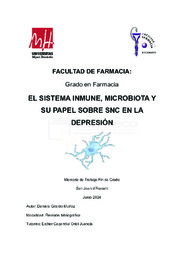Please use this identifier to cite or link to this item:
https://hdl.handle.net/11000/32643Full metadata record
| DC Field | Value | Language |
|---|---|---|
| dc.contributor.advisor | Caparrós, Esther | - |
| dc.contributor.advisor | Juanola, Oriol | - |
| dc.contributor.author | Giraldo Muñoz, Daniela | - |
| dc.contributor.other | Departamentos de la UMH::Medicina Clínica | es_ES |
| dc.date.accessioned | 2024-07-23T10:26:27Z | - |
| dc.date.available | 2024-07-23T10:26:27Z | - |
| dc.date.created | 2024-05-23 | - |
| dc.identifier.uri | https://hdl.handle.net/11000/32643 | - |
| dc.description.abstract | La depresión, y su prevalencia, ha ido en aumento conforme pasan los años, y se ha visto empeorada por el aumento del estrés, tanto social, como laboral, o por las distintas enfermedades, que ya padecen un gran número de personas. El pronóstico de personas con enfermedades subyacentes graves o crónicas, y que padecen depresión, no es bueno, ya que los trastornos mentales disminuyen su calidad y esperanza de vida. Uno de los mecanismos patogénicos que influye en la depresión es la descompensación del sistema inmunitario, que se asocia con una respuesta inflamatoria persistente, que termina por afectar al SNC. Por otro lado, en los últimos años se ha descrito la capacidad de la microbiota intestinal de influir de forma directa o indirecta en trastornos psicológicos, como la depresión. En este trabajo, estudiaremos la contribución de la respuesta inflamatoria y la microbiota intestinal al desarrollo de la depresión. De hecho, gracias a la recopilación de estudios actuales, sabemos que los pacientes con trastornos neurológicos presentan un aumento de marcadores inflamatorios, así como disbiosis intestinal. Por ello, sabemos que los factores que afectan a la depresión son múltiples, por lo que es necesario conocer en profundidad los mecanismos que influyen a la patogénesis de la depresión. Esto permitiría tratar a las personas de una manera individualizada en función del origen de su trastorno. | es_ES |
| dc.description.abstract | Depression, and its prevalence, have increased over the years. This neurological disorder has been worsened by the increase in stress, both social and work-related, or by different diseases, from which a large number of people already suffer. The prognosis of people with serious or chronic underlying diseases, and who suffer from depression, is not good, since mental disorders reduce their quality and life expectancy. A pathogenic mechanism that influences depression is the decompensation of the immune system, which is associated with a persistent inflammatory response, which ends up affecting the CNS. On the other hand, it has recently been described the ability of the intestinal microbiota to directly or indirectly influence psychological disorders, such as depression. In this work, we will study the contribution of the inflammatory response and the intestinal microbiota to the development of depression. In fact, through to the collection of current studies, we know that patients with neurological disorders present an increase in inflammatory mediators, as well as intestinal dysbiosis. Therefore, we know that the factors contributing to depression are multiple, so it is necessary to understand in depth the mechanisms that influence the pathogenesis of depression. This would allow people to be treated in an individualized manner depending on the origin of their disorder. | es_ES |
| dc.format | application/pdf | es_ES |
| dc.format.extent | 46 | es_ES |
| dc.language.iso | spa | es_ES |
| dc.publisher | Universidad Miguel Hernández | es_ES |
| dc.rights | info:eu-repo/semantics/openAccess | es_ES |
| dc.rights.uri | http://creativecommons.org/licenses/by-nc-nd/4.0/ | * |
| dc.subject | microbiota | es_ES |
| dc.subject | sistema inmune | es_ES |
| dc.subject | depresión | es_ES |
| dc.subject.other | CDU::6 - Ciencias aplicadas::61 - Medicina::615 - Farmacología. Terapéutica. Toxicología. Radiología | es_ES |
| dc.title | El sistema inmune, microbiota y su papel sobre el SNC en la depresión | es_ES |
| dc.type | info:eu-repo/semantics/bachelorThesis | es_ES |

View/Open:
TFG Daniela Giraldo Muñoz.pdf
3,1 MB
Adobe PDF
Share:
.png)
